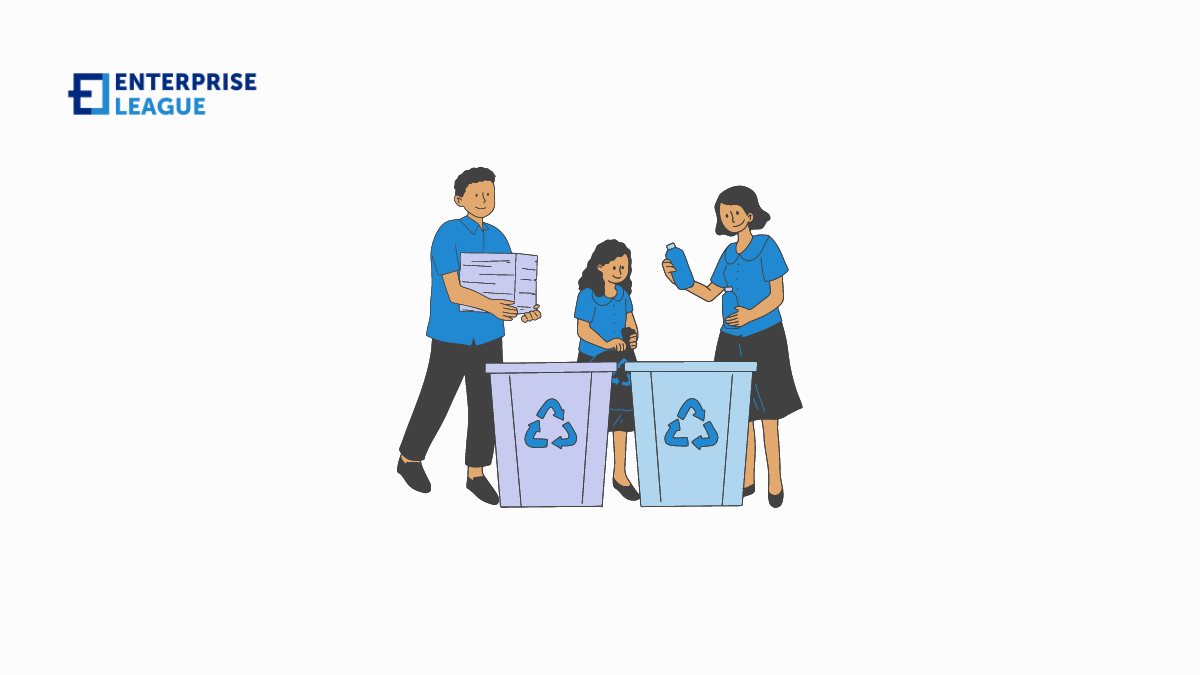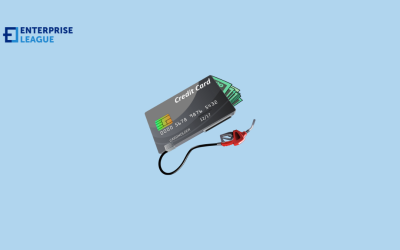As the population on earth grows each day, so does the pollution and waste too. Even though we live in modern times now where we seem to have solutions for almost everything, the only thing we still can’t find a way to resolve is global waste management. Given the circumstances and the place where we are, we can assure you that starting a recycling business or exploring environmental startups nowadays is definitely something to consider since the market is expected to grow considerably by 90 billion USD in 2032. The industry is huge and it’s willing to give a chance to everyone that will come up with fresh and new innovations. We believe that if you take your time to do throughout market research, you can find diverse recycling business ideas that are in demand in order to save our planet and the environment.
Top 17 recycling business ideas
Here are some creative and profitable recycling business ideas that you can start right away:
Composting
A composting business could offer an eco-friendly service while also being profitable. Composting takes organic waste, like food scraps and yard trimmings, and converts it into nutrient-rich soil amendments through controlled decomposition. This diverts waste from landfills. The resulting compost can then be sold to consumers like gardeners, farms, nurseries, and landscaping companies – creating a revenue stream.
There is also growing consumer and corporate demand for green, sustainable practices like composting. A composting business helps meet this need while promoting ecological benefits like reduced landfill volumes and nurturing healthy soil. Hooking into environmental trends and converting waste streams into sellable compost and even renewable energy, composting entrepreneurship inherently aligns with the “reduce, reuse, recycle” ethos.
How much you can make: $30,000 – $500,000 annually
How much does it cost to start: $5,000 – $100,000
How long does it take to build: 3-6 months
Paper recycling
Paper recycling involves collecting discarded paper waste like cardboard, newsprints, and office documents for processing into recycled material usable for manufacturing new paper products ranging from office paper to cardboard boxes sustainably. By diverting recoverable fiber streams otherwise landfilling unnecessarily besides, incremental reprocessing reduces both waste accumulation and additional tree harvesting traditionally equating copy paper production otherwise continuously through renewable conscientiousness.
Though intensive machinery investments make barriers steep for smaller operators initially, staggered growth strategies leveraging contracted processing partnerships, governmental subsidies, and public education campaigns cultivate market demand over time through steady community engagement, ultimately improving waste habits and changing gradually.
How much you can make: $50,000-$500,000 per year
How much does it cost to start: $50,000-$500,000
How long does it take to build: 6-12 months
Glass recycling
Glass recycling involves collecting and processing discarded glass like bottles, containers, and windows to convert waste material into recycled glass cullet usable for manufacturing new sustainable products ranging from new bottles to construction aggregates, avoiding landfill accumulations unnecessarily.
By sorting, crushing, and sterilizing post-consumer glass streams otherwise hard to repurpose conventionally, the transparent shards become feedstock commodities substituting raw material inputs like sand chronically for instance across glass producers seeking targets upholding. Though intensive machinery investments pose barriers initially for smaller operators exploring cratering recycling niches underserved still by big processors intermittently besides, staggered growth strategies leveraging contracted sorting partnerships, governmental volume subsidies, and public awareness campaigns help cultivate local market demand over time through steady community engagement ultimately improving habit shifts gradually.
How much you can make: $50,000-$500,000 per year
How much does it cost to start: $100,000-$1,000,000
How long does it take to build: 6-18 months
Plastic recycling
Plastic recycling involves collecting and processing discarded plastic like water bottles, takeout containers, and shopping bags to convert waste material into recycled plastic feedstocks used for manufacturing new sustainable products ranging from polyester clothing, 3D printing filament to outdoor patio furniture instead of discarding recoverable into landfills unnecessarily.
By sorting, cleaning, and pelletizing various plastic polymer grades according to heating properties and potential reuse applications ranging widely, the versatile material gets an opportunity to substitute traditionally manufactured plastics continually where technical specifications align for producers committing environmental stewardship through voluntary recycled material utilization targets proactively.
How much you can make: $100,000-$1,000,000 per year
How much does it cost to start: $200,000-$2,000,000
How long does it take to build: 12-24 months
Battery recycling
Battery recycling involves sustainably collecting and responsibly processing discarded single-use and rechargeable consumer batteries to separate and recover component metals/chemicals otherwise hard disposing directly without considerable environmental contamination risks disconcertingly. By sorting common alkaline cells alongside lithium coin cells and lead-acid varieties and then directing specialized downstream handlers accordingly, regulated battery recyclers uphold public and ecological safety through compliant materials diversion responsibly.
For recycling operators electing dedicated battery diversion early before regulatory obligations mandate marketwide practically regardless, proactive safe handling earns consumer eco-trust rapidly while steering material resources back into forward-looking industries progressing greener technologies benefiting communities universally.
How much you can make: $50,000-$500,000 per year
How much does it cost to start: $100,000-$1,000,000
How long does it take to build: 6-18 months
E-waste recycling
E-waste recycling involves sustainably collecting and responsibly dismantling electronics like computers, mobile phones, and home appliances to selectively separate reusable component materials for reintroduction across manufacturing supply chains instead of discarding recoverably into landfills unnecessarily.
By sorting plastics and metal alloys according to various heating properties and magnetism besides harvesting minor precious metals found on printed circuit boards, tedious yet vital segregation processes allow specific commodity-level redirection into circular supply streams benefiting producers by reutilizing secondary feeds affordably.
How much you can make: $100,000-$1,000,000 per year
How much does it cost to start: $200,000-$2,000,000
How long does it take to build: 12-24 months
Textile recycling
Textile recycling takes old clothes, fabrics, and other textiles and turns them into new products or materials. This helps solve the growing problem of textile waste, which is a major cause of pollution and greenhouse gas emissions when textiles end up in landfills. By recycling textiles instead of throwing them away, it creates a cycle where materials are reused.
This sustainable approach appeals to people who care about the environment and want to buy eco-friendly products. The textile recycling business can also be financially successful. It can make money by selling new products or recycled materials. It can also create new jobs in collecting, sorting, and processing the textiles. As more people focus on being environmentally friendly, this type of business has a lot of potential.
How much you can make: $100,000-$1,000,000 per year
How much does it cost to start: $200,000-$2,000,000
How long does it take to build: 12-24 months
Furniture recycling
Furniture recycling takes old or unwanted furniture and gives it new life. It collects these items, repairs and refurbishes them, and then resells them. This helps reduce the amount of furniture that ends up in landfills, which is better for the environment. The furniture recycling business also has financial benefits. It can make money by selling refurbished furniture at a lower cost than brand-new pieces.
This makes quality furniture accessible to more people. Also, the business can create jobs in collecting, fixing, and reselling the furniture. Since more people focus on sustainability, this type of business has a lot of growth potential.
How much you can make: $50,000-$500,000 per year
How much does it cost to start: $50,000-$500,000
How long does it take to build: 6-12 months
Food waste recycling
Food waste recycling is an innovative way to address the problem of food waste. It involves collecting leftover and discarded food items from homes, businesses, and institutions, and then processing them into useful products. This could include turning the waste into compost, biofuel, or animal feed. This business idea is beneficial for several reasons. First, it helps reduce the amount of food that ends up in landfills, which is better for the environment. Food waste that decomposes in landfills releases methane, a potent greenhouse gas.
By recycling the food waste, the business can prevent these harmful emissions. It’s important to mention that the food waste recycling business can create new revenue streams. The compost, biofuel, or animal feed produced from the recycled food can be sold to farmers, energy companies, or other businesses. This provides an economic incentive for the recycling operation and makes it a potentially profitable business.
How much you can make: $50,000-$500,000 per year
How much does it cost to start: $100,000-$1,000,000
How long does it take to build: 6-18 months
Mattress recycling
Mattress recycling involves collecting old discarded mattresses, extracting and reconditioning raw materials embedded inside for reuse in new consumer goods, and responsibly diverting landfill waste while supplying recycled textiles and bedding components to manufacturers seeking sustainable inputs. This allows an eco-conscious microbusiness to meet environmental expectations.
By employing manual disassembly mastery salvaging steel, foam, fibers, and wood from worn mattresses otherwise occupying landfill airspace, the visionary decomposer cost-effectively taps into circular economic principles realigning waste streams without reliance on fossil-fuel-intensive overseas mass-production systems. The goods renewer thereby prevents harmful dumping while powering domestic industries benefiting end-consumers ecologically.
How much you can make: $50,000-$500,000 per year
How much does it cost to start: $100,000-$1,000,000
How long does it take to build: 6-18 months
PVC recycling
PVC recycling involves collecting post-industrial and post-consumer PVC plastic waste, extracting materials embedded inside for reuse in new products responsibly diverting landfill plastic while supplying recycled vinyl to manufacturers seeking sustainable inputs meeting circular economic principles. This allows an eco-conscious microbusiness to meet environmental expectations.
By employing advanced mechanical recycling mastery salvaging useful fractions from piping leftovers to food wrapping films otherwise occupying landfill airspace, the visionary entrepreneur taps into virtuous circular systems realigning plastic streams without reliance on fossil-fuel-intensive virgin resin overseas. The goods renewer thereby prevents harmful dumping while powering domestic industries benefiting end-consumers ecologically.
How much you can make: $50,000-$500,000 per year
How much does it cost to start: $100,000-$1,000,000
How long does it take to build: 6-18 months
Kitchen utensil recycling
Kitchen utensil recycling is a unique and environmentally friendly venture that capitalizes on the growing need for sustainable solutions. At its core, the idea is simple, it provides a convenient way for households and commercial kitchens to recycle their old, worn-out, or unwanted kitchen tools and utensils. Instead of these items ending up in landfills, the business collects them, refurbishes or repurposes them, and then resells them at affordable prices to customers who are looking for quality kitchen equipment without the hefty price tag.
By offering a practical solution to a common problem, this business idea has the potential to make a positive impact on both the environment and the lives of its customers.
How much you can make: $25,000-$250,000 per year
How much does it cost to start: $25,000-$250,000
How long does it take to build: 3-9 months
Water recycling
Water recycling involves collecting wastewater from residential, commercial, and industrial sources and treating it through advanced filtration and purification processes to make it suitable for reuse in non-potable applications instead of discharging it to sewers. Water recycling companies install specialty equipment onsite efficiently cleaning water to strict standards meeting irrigation, cooling towers, and even toilet flushing quality tiers conservatively. This alleviates municipal discharge burdens while offsetting substantial volumes facilities otherwise purchase from utilities monthly.
As climate change strains water access globally, sustainable recycling enables reduced extraction balancing consumption and replenishment rates regionally. For facilities managers seeking greener footprints proactively, validated recycling promotes public trust and regulatory goodwill rewarding efforts voluntarily beyond mere compliance itself.
How much you can make: $100,000-$1,000,000 per year
How much does it cost to start: $500,000-$5,000,000
How long does it take to build: 12-36 months
Construction waste recycling
Construction waste recycling involves collecting the debris, concrete, asphalt, wood, metals, gypsum, and other recoverable materials generated from construction, renovation, and demolition projects and then processing it for reuse instead of landfilling. Operators provide waste diversion services and onsite sorting of recyclable components builders large and small require meeting sustainability goals and regulations but find it difficult to coordinate individually. Specialized processing then reintroduces sizable fractions of salvaging labor, transportation, and future goods production emissions otherwise wasted needlessly.
For builders striving to reduce footprints through smart design now and business operators seeking new profit centers adjacent vertically, construction waste recycling addresses eco-challenges collaboratively lifting limitations widescale through sensible solutions. Successful resource reutilization depends on aligning reliable pickup and handling as much as economical sorting and reuse channels downstream balancing intake continuity against market demand.
How much you can make: $100,000-$1,000,000 per year
How much does it cost to start: $200,000-$2,000,000
How long does it take to build: 12-24 months
Medical waste recycling
As sustainable healthcare commitments spread but internal capacity remains limited tackling waste reductions actively, validated medical waste recyclers allow meeting goals through certified offsite solutions. Rigorous protocols enforced by regular audits safely integrate recoverable waste diversion rates facilities announce publicly while electronically tracking all containers. For facility owners striving to reduce environmental footprints through intelligent waste plans immediately, responsible recycling partnerships enable benchmarking present status, identifying savings opportunities, and providing reliable data ensuring accountable reductions to celebrate internally and across communities served proudly.
How much you can make: $100,000-$1,000,000 per year
How much does it cost to start: $500,000-$5,000,000
How long does it take to build: 12-36 months
Computer recycling
Computer recycling involves providing secure data destruction along with environmentally responsible recycling of computers, servers, monitors, and other electronics businesses and residents upgrade frequently yet contain reusable components and irreplaceable information requiring specialist handling. NAID-certified destruction processes fully erase confidential data banks safely while separating precious metals, plastics, glass, and other specialized materials for transformation into future products diverting tons from landfills.
For organizations phasing out IT equipment continually seeking balance within ethical budgets, reputable IT recyclers ensure complete hardware repurposing aligned to corporate zero waste visions or social value creation pledges publicly admired. As hazardous e-waste piles accumulate faster than municipal bodies address alone, certified IT recyclers alleviate environmental damages through registered collection protecting staff and neighborhoods while salvaging resources benefiting coming generations ecologically, educationally, and economically.
How much you can make: $50,000-$500,000 per year
How much does it cost to start: $100,000-$1,000,000
How long does it take to build: 6-18 months
Conclusion
The opportunities in the recycling industry are limitless. By turning waste into valuable products, you can not only help the environment but also build a thriving and sustainable business. Speaking of sustainable business, take a look at these thriving waste management startups and who knows maybe the next one will be yours. Remember, with creativity, innovation, and a commitment to the circular economy, entrepreneurs can find success in recycling. So don’t be afraid to get creative and turn trash into treasure. The recycling business of tomorrow is yours to build.
More must-read stories from Enterprise League:
- What’s the secret to running successful cold email campaigns?
- The importance of customer-focused strategy for your business.
- The only list of novels for entrepreneurs that you will ever need.
- Getting your product in stores doesn’t have to be complicated.
Related Articles
What Are the Top-Rated Fuel Cards for Businesses Operating Nationwide
Fuel expenses can eat into operational costs and profits if left unchecked. The bigger the fleet a company has, the more significant the loss. Specialized fuel cards emerge as a viable solution to boosting fuel savings, security, and streamlining expense management....
How do I reserve a space for a trade show in Pennsylvania
Trade shows are excellent business opportunities. Your upcoming event should occur in a space big enough to hold all participating brands while leaving room for visitors. Learning how to reserve a space for a trade show in Pennsylvania will help you find the best...
What Are the Best Event Venues for Corporate Meetings?
Finding the perfect event venue for your corporate meetings requires careful consideration of location, amenities, accessibility and reputation. The best venues provide excellent audio-visual capabilities, flexible meeting spaces, and professional decor options to...
What Are the Top-Rated Fuel Cards for Businesses Operating Nationwide
Fuel expenses can eat into operational costs and profits if left unchecked. The bigger the fleet a company has, the more significant the loss. Specialized fuel cards emerge as a viable solution to boosting fuel savings, security, and streamlining expense management....
How do I reserve a space for a trade show in Pennsylvania
Trade shows are excellent business opportunities. Your upcoming event should occur in a space big enough to hold all participating brands while leaving room for visitors. Learning how to reserve a space for a trade show in Pennsylvania will help you find the best...






